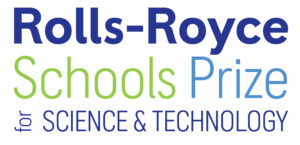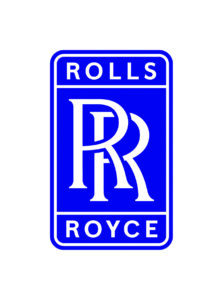Our Subject
CLICK IMAGE BELOW TO WA
TCH THE VIDEO
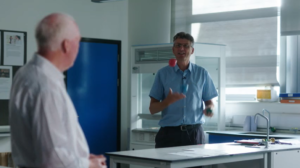
A Level Physics FAQs
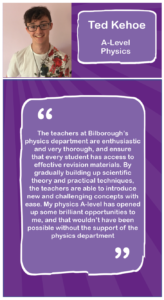
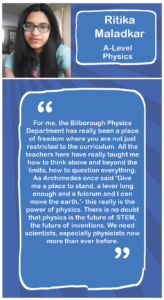
What are the scientists studying tiny sub-atomic particles at CERN trying to find out? How do we decide where to put satellites? What is the best way to provide energy in the future? Why do hot air balloons float? And why is the sky blue? If any of these questions make you think, “Hmm, I’d like to know that”, then A-Level Physics is your chance to find out. You’ll use your maths skills and scientific reasoning to understand how the universe works, from the smallest particles imaginable to the vastness of space. You’ll be building your skills of explaining these along with your ability to accurately take measurements through our weekly practical sessions that include use of data-logging equipment and simulation software packages. All of this makes A-level Physics a busy and demanding choice but with around 20 Physics students in each class, your teachers will guide your progress and can give everyone the support and attention required by this worthwhile and exciting subject. Together with the good organisation and strong work ethic that we will help you to develop outside lessons, this will let you confidently expect good grades… last year over 50% of our students achieved A*, A or B grades at A-level, for example.
To study Physics at Bilborough, you will need to have a minimum of a grade 6 in Maths and a 5 in English Language. In addition you need to have 6 in Core and Applied GCSE Double Science or a 6 in Physics if you have studied Triple Science.
BTEC Science Level 2 is not sufficient, but please consider our BTEC Science Level 3 courses.
Our links with HE
A-Level Physics is both interesting and useful for helping you understand everyday phenomena and technology. It’s certainly a demanding course – we’ve designed it so you improve your thinking skills throughout – and this makes it highly regarded by universities and many employers. Nationally, there are too few students taking Physics A-level and progressing on to related degrees, so many universities and employers offer bursaries, sponsorship or enhanced salaries. Our students often go on to study Engineering, Physics, Mathematics and or Computing, Music Technologies and Medicine; we also know that those who choose to become lawyers, accountants or teachers find their Physics A-level a real boost to their applications.
We have strong links with many university departments, particularly the Physics and Engineering faculties at the University of Nottingham and Nottingham Trent University. You will have chances, both in Year 12 and 13, to find out more about the university experience, through master classes or the residential courses offered by many top universities… check the Headstart courses which we regularly have students attending.


